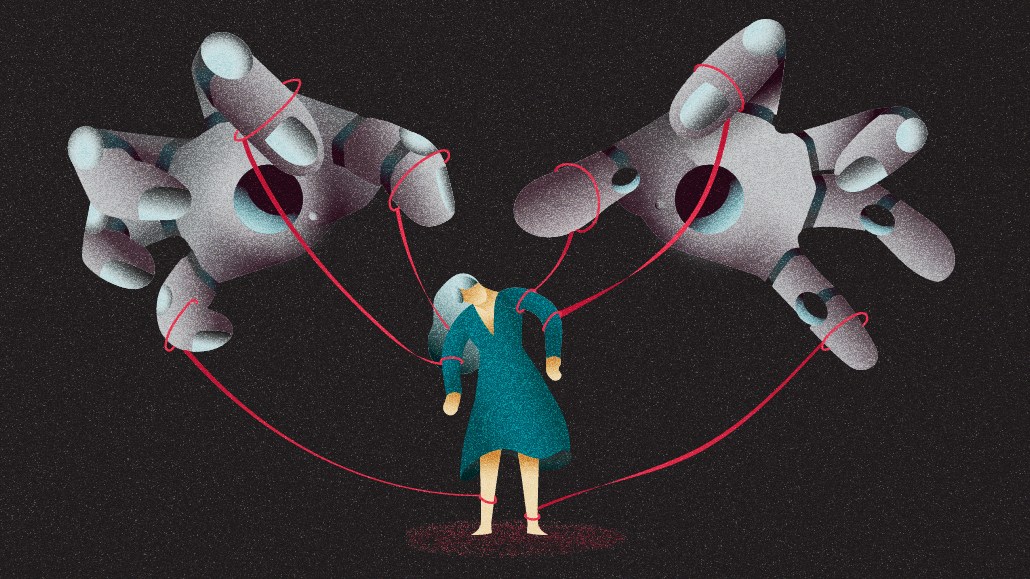Secure your place at the Digiday Media Buying Summit in Nashville, March 2-4

Newsroom unions are asking their employers to agree to new terms on how generative artificial intelligence is used and the impact it will have on their employees and editorial production as more media companies begin to adopt the technology.
The topic of AI use is a complicated and nuanced issue and the way the technology is being implemented at media companies varies widely. As employers determine how to adopt AI into their businesses, newsroom unions are also determining how to negotiate with company management around its impact to their members.
Insider’s union reached a tentative agreement on a contract with their employer with language that addresses the topic, stating that the newsroom will have at least one union member involved in conversations about using new tech like AI — as well as the resources to learn how to use it.
U.S. editorial employees at the FT’s trade publications are pushing to have new technology like AI be a subject of bargaining with company management, a WGA East spokesperson said. It’s the only tentative agreement touching on the topic of AI at WGA East’s newsroom unions so far, they added.
Meanwhile, Dow Jones’ union IAPE proposed new AI-related language as part of their ongoing contract negotiations, stating that the company will not “displace” union members by using AI tools such as OpenAI’s ChatGPT or Google’s Bard.
“We’re all kind of scrambling to try to figure out how to handle it,” said one editor at G/O Media, who is involved in lobbying G/O Media to revisit its union contract to include AI-related language.
Many of the major news publishers are based in New York with unionized newsrooms represented by either WGA East — which includes G/O Media, Hearst and Vox Media — or the News Guild — which includes Gannett, Insider and The New York Times. Anecdotally, Lowell Peterson, executive director of the WGA East, said that more of its unions are asking for AI language in their contracts, but could not say how many. A News Guild New York spokesperson did not respond to questions around how many of the newsroom unions it represents are having these conversations.
Unions are often at the frontlines of changing industry trends that impact the workplace. During the pandemic, unions sought to secure work from home benefits, hybrid work and COVID-19 protections. When the economic slowdown led to a number of newsroom layoffs in the last year, unions negotiated with their employers over the number of people let go and severance packages.
However, if those recent examples are any indication, the process of lobbying management to ultimately add language around specific issues — AI, in this case — to union contracts could be a lengthy process. During the pandemic, bargaining over return to office policies took years in some cases, for example.
AI already in place
Some newsrooms are already generating content with AI. Companies like G/O Media, Arena Group and Red Ventures are testing the use of AI technology like OpenAI’s ChatGPT, Jasper and Nota to generate articles, creating SEO-driven content to get ranked and surfaced on Google Search with the aim of boosting traffic.
Other publishers, like Gannett and BuzzFeed, are using AI tools to optimize headlines and article summaries, and to produce new products like chatbots and quizzes, respectively. The majority of these AI initiatives have been led by management. The union at CNET, which is owned by Red Ventures, formed in May after managers started publishing AI-generated articles on the site, in part to negotiate these matters.
About a week ago, G/O Media editorial director Merrill Brown informed staff that the company would start producing editorial content generated by AI, and the first few articles went live last Wednesday, the G/O editor said. The union is pushing back, asking management to pause these efforts. G/O did not have additional comment. GMG Union is also calling on the public to help, taking to Twitter to urge readers not to click on stories with a “bot” byline.
How unions are bargaining over AI use
Most of the newsrooms already using AI did not have preliminary discussions about its use with the unions and the employees they represent — and whose jobs they counter could be at risk with the technology.
Ideally, a newsroom union and company management would jointly decide how newsrooms will use AI technology, explained Peterson.
But if the company decides how it will use AI for editorial production, the union can push management to take part in “effects” bargaining — or to discuss the impact of the decision on union members, especially for unions that already have an agreed-upon, ratified contract, Peterson continued. If there is an agreement, it would be added as an addendum to a newsroom union’s existing contract. If a union is currently negotiating over a new contract, they can propose sections around AI.
“This is not like putting in an electric typewriter instead of a manual typewriter,” Peterson said. “The range of effects could be pretty broad. It can range from changing the workflow in the newsroom… to actually eliminating jobs.”
More in Media

From feeds to streets: How mega influencer Haley Baylee is diversifying beyond platform algorithms
Kalil is partnering with LinkNYC to take her social media content into the real world and the streets of NYC.

‘A brand trip’: How the creator economy showed up at this year’s Super Bowl
Super Bowl 2026 had more on-the-ground brand activations and creator participation than ever, showcasing how it’s become a massive IRL moment for the creator economy.

Media Briefing: Turning scraped content into paid assets — Amazon and Microsoft build AI marketplaces
Amazon plans an AI content marketplace to join Microsoft’s efforts and pay publishers — but it relies on AI com stop scraping for free.







